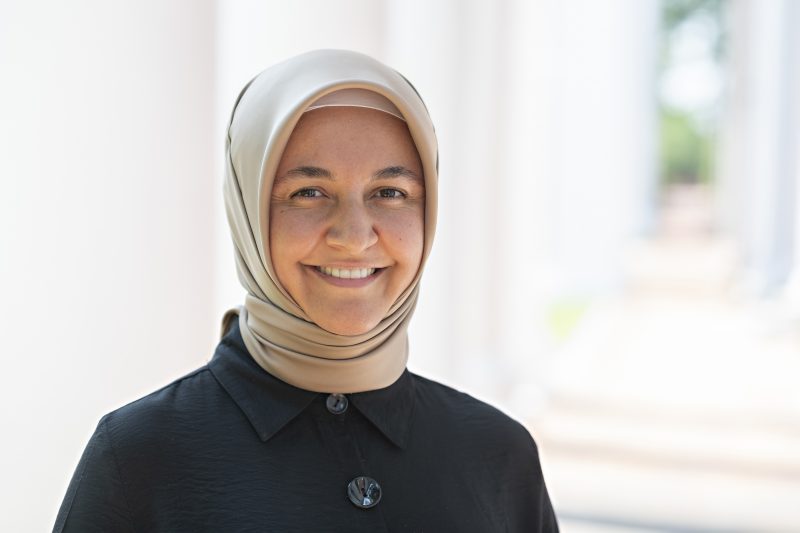Meet the Professor: Hulya Dogan Hulya Dogan, visiting assistant professor of anthropology, joined W&L this fall.
Hulya Dogan, visiting assistant professor of anthropology, joined the Department of Sociology and Anthropology this fall. Prior to W&L, she taught a variety of courses at Virginia Tech and Radford University.
Dogan earned her undergraduate degree in language and literature in Turkey. Upon completion of her bachelor’s degree, she moved to the United States for graduate school. She earned her doctorate in anthropology from Texas A&M University and a women and gender studies graduate certificate.
Q: What are your research interests centered around?
My research interests are centered around migration and refugees, transnationalism, gender, identity, Middle East, Central Asia and North America.
Q: Any new projects?
I am currently working on an article manuscript titled “Bargaining with Patriarchy: The Intersection of Gender and Generation among Meskhetian Turks in Diaspora.” Acknowledging that my research has practical implications for assisting migrants and refugees in the United States, I have extended my research in new directions. I was the organizer and the moderator of a session at the United Nation’s 60th and 62nd Sessions of the Commission on the Status of the Women in March 2016, 2018 and 2019 entitled “Empowering Women Refugees for Successful Integration into the United States Society through Quality Education.” Since then, I have been collaborating with the YMCA, Catholic Charities, the United Methodist Church and Pan-Pacific and Southeast Women’s Association to develop an applied project on the role of the American education system in the process of a refugees’ and immigrants’ integration to the American society. In this vein, I am actively involved in several NGOs in Southwest Virginia. We are currently in the process of drafting grant applications to support this project.
I am also currently working on social media analysis on refugees and immigrants, especially after current issues in different parts of the world. As a research group, we are working on a project in which we do sentiment and text analysis on Twitter about the current refugee influx in the United States.
Q: What are you teaching this fall?
This fall I am teaching two sections of Introduction to Anthropology (SOAN 101) class.
Q: What first attracted you to Washington and Lee University?
Washington and Lee University attracted me in many ways. First and foremost, teaching in a liberal arts college was one of my wishes after completing my doctorate. When I saw the job advertisement, I knew that this would be a great opportunity. In addition to all of that, the location, student body, campus culture and the collegiality of the faculty make W&L a great place to be part of.
Q: Aside from teaching, what’s something that you’re passionate about? What do you do for fun?
I keep up with a variety of hobbies. I go hiking with my children and husband on the weekends and get out near the ocean in the summer. I’ve also recently gotten into knitting, but I’ve got a long way to go before I can make you a pair of mittens.
I also like traveling, even if I cannot travel as much as I want yet. I love learning and adapting to new cultures, finding commonalities between people everywhere, and just trying a bunch of new foods. There’s real magic to communication in that so much of it is nonverbal, and I’ve learned to pick up on body language and read the room even if I can’t always read the menu.
Q: What is your favorite movie or book? Why?
My favorite book is “The Plague” by Albert Camus. I really like this book because Camus very successfully depicts the entire range of human responses to suffering, loneliness and hardship under an epidemic. Every character in the book experiences suffering, but their responses differ wildly. It is an entirely human work about humans and their conditions. When I think about people and their emotional well-being, I invariably turn to the revelations in this book for understanding, support and clarity.
I first read the book in school over two decades ago. I have reread it during the pandemic with more fascination and with growing compassion and understanding for the less heroic characters and their fears and petty actions.
Q: What was the best piece of advice you were given as a student?
One of the best pieces of advice given to me by my professors was “Always be kind.” There is nothing to lose when you are kind, and kindness is contagious.
The second one is “Life is all about choices.” I used to hear this advice during my school years, but I understood it as I lived through several occasions where I had to choose and how they changed my life.
Q: Share a fun fact about yourself.
I can read and say the words backward in seconds.
If you know any W&L faculty who would be great profile subjects, tell us about them! Nominate them for a web profile.
 Visiting Assistant Professor of Sociology and Anthropology Hulya Dogan
Visiting Assistant Professor of Sociology and Anthropology Hulya Dogan
You must be logged in to post a comment.